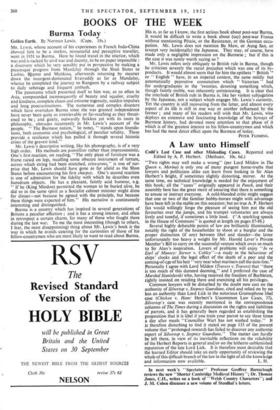A Law unto Himself
Codd's Last Case and other Misleading Cases. Reported and Edited by A. P. Herbert. (Methuen. 10s. 6d.) "Two rights may well make a wrong" (per Lord Mildew in The Queen v. Merino) is only one of many pungent home-truths that lawyers and politicians alike can learn from looking in Sir Alan Herbert's bright, if sometimes slightly distorting, mirror. At the same time, no technical knowledge is needed for the enjoyment of this book; all the "cases" originally appeared in Punch, and their assembly here has the great merit of ensuring that there is something to amuse or instruct everyone. A cold-blooded critic might suggest that one or two of the familiar hobby-horses might with advantage have been left in the stable on this occasion; but no true A. P. Herbert fan would willingly forgo the pleasure of seeing him put the old favourites over the jumps, and his trumpet voluntaries are always lively and tuneful, if sometimes a little loud. ("A sparkling speech in the House of Commons" is quoted at length on pages 87-88.) Several highly debatable points of law are brilliantly illuminated, notably the right of the householder to shoot at a burglar and the proper distinction (if any) between libel and slander—the latter unfortunately too heavy a weight for Mr. Harold Lever's Private Member's Bill to carry on the successful venture which owes so much to Sir Alan's inspiration. Lovers of problems will enjoy "In re Earl of Munsey: Stewer v. Cobley"—a study in the behaviour of ships' clocks and the legal effect of the death of a peer and the coming-of-age of his heir "very near what mariners call the date-line." Personally I agree with Lord Mildew (Travers v. Travers) that "there is too much of this damned deeming," and I preferred the case of Marshal Stanislayski who, having received the freedom of Burbleton, rightly insisted on residing there and exercising all his privileges. Common lawyers will be disturbed by the doubt now cast on the authority of Silvertop v. Stepney Guardians, cited and relied on by no less an authority than Lord Lick in the notorious Gramophone libel case (Chicken v. Ham: Herbert's Uncommon Law Cases, 37). Silvertop's case was recently mentioned in the correspondence columns of The Times during a discussion on the rights and liabilities of parrots, and it has generally been regarded as establishing the proposition that it is libel if you train your parrot to say three times a day after meals "Councillor Wart has not washed today." It is therefore disturbing to find it stated on page 133 of the present volume that "prolonged research has failed to discover any authentic report of Silvertop v. Stepney Guardians." The matter can hardly be left there, in view of its inevitable reflections on the reliability of the Herbert Reports in general and/or on the hitherto unblemished reputation of the late Lord Lick. It is therefore most desirable that the learned Editor should take an early opportunity of reviewing the whole of this difficult branch of the law in the light of all the knowledge


































 Previous page
Previous page